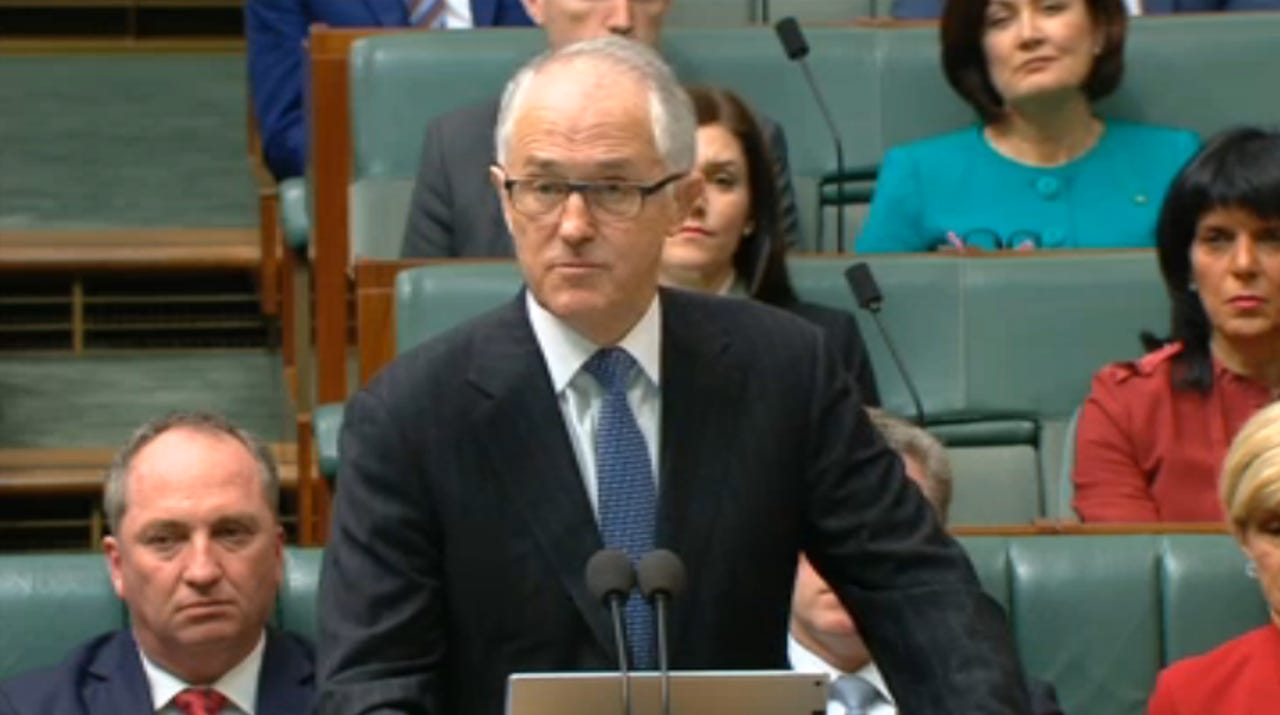Australian government is not interested in encryption backdoors: Turnbull


Malcolm Turnbull has told Parliament that the Australian government is not going to demand the creation of encryption backdoors, and is instead going to focus on collaboration and receiving greater assistance from social media and telecommunications companies.
"This is not about creating or exploiting backdoors, as some privacy advocates continue to say, despite constant reassurance from us," the prime minister said on Tuesday.
"We need even stronger cooperation from the big social media and messaging platforms in the fight against terrorism and the extremism which spawns it.
"Encryption ... is a vital piece of security for every user of the internet. Protecting all of us as we go about our lives from shopping, to banking, to chatting online. However, encrypted messaging applications are also used by criminals and terrorists."
Turnbull said that despite the "strong libertarian tradition" of companies based in Silicon Valley, the privacy of a terrorist cannot be more important than public safety, and said it is balancing community safety with civil liberties.
"The government has a proven track record of getting a track record between ensuring the safety and security of the people, and defending the liberties and freedoms of that are integral to our way of our life."
Under the Liberal government, with the support of the Labor opposition, the Telecommunications (Interception and Access) Amendment (Data Retention) Act 2015 was passed in March 2015 and mandated the collection of customers' call records, location information, IP addresses, billing information, and other data to be stored for two years by telecommunications carriers, accessible without a warrant by law-enforcement agencies.
Turnbull said metadata had been used to break up 12 disruptions of terror plots since 2014.
"Metadata has proven vital in nearly every serious criminal investigation conducted today, from organised crime, child sex offences, to counterespionage, cybersecurity, and counterterrorism," he said.
Following the recent WannaCry incident, Turnbull said the government has created a taskforce to quickly respond to online security threats and incidents.
In response, Opposition Leader Bill Shorten said the resources of the Australian Signals Directorate and the Australian Cyber Security Centre should be used to protect small and medium businesses from attacks, and called on big internet companies to do more.
"The big internet companies have very quickly become an essential part of our free, democratic society, but they need to realise this is a two-way relationship," he said. "They need to be part of our society in the sense of working with us, as well as taking from us.
"They need to see this fight as their fight, not just our fight. Not just a fight where they help when asked, but a fight in which they come to us with ideas."
Shorten said social media companies are in a position to tackle the "underbelly of terror propaganda", and are involved in the process of content being put online.
"We need them to be proactive, not reactive. Terrorism does not self-police, so we cannot rely on a self-policing system," he said.
The Labor leader called for the tracking of electronic currencies, such as bitcoin.
In 2014, the Australian Transaction Reports and Analysis Centre, the Australian government agency responsible for countering money laundering and the financing of terrorism, said it was able to track each conversion transaction from bitcoin into or out of Australian dollars.
"Australia is very fortunate among its international counterparts in that we are one of the few countries which currently collects all international funds transfers into or out of Australia," John Schmidt, CEO of Austrac, told Senate Estimates at the time.
"At some point, a person will be purchasing bitcoin using Australian dollars, for example, and then, if they are dealing in substances or services, will want to convert those bitcoins back into the legitimate currencies of wherever they are, so they can gain the benefit of them.
"Because we get the international funds transfers instructions, it is possible using other intelligence sources to identify transactions where people are purchasing bitcoins."
Turnbull said the government would be looking to pass its Telecommunications Sector Security Reforms in this sitting period of Parliament.
The reforms force telco carriers and carriage service providers (CSPs) to do their best to protect their networks from unauthorised access or interference for the purpose of security, with carriers and CSPs to notify the Attorney-General's Department of any changes to their services, systems, or equipment that could have a "material adverse effect" on their ability to comply with this duty.
Over the weekend, British Prime Minister Theresa May and French President Emmanuel Macron said Facebook and Twitter could see hefty fines if they fail to remove extremist and terrorist content.